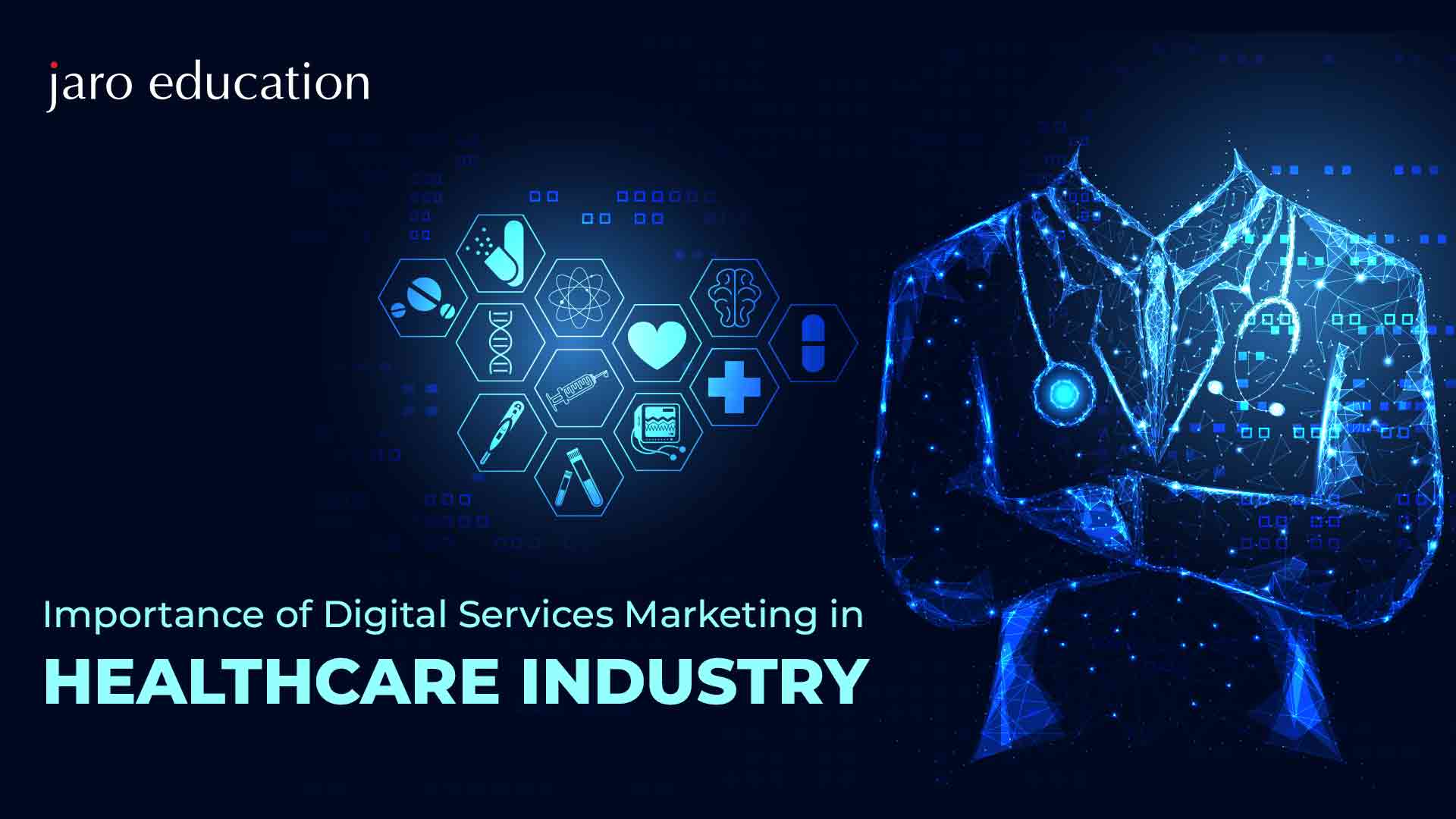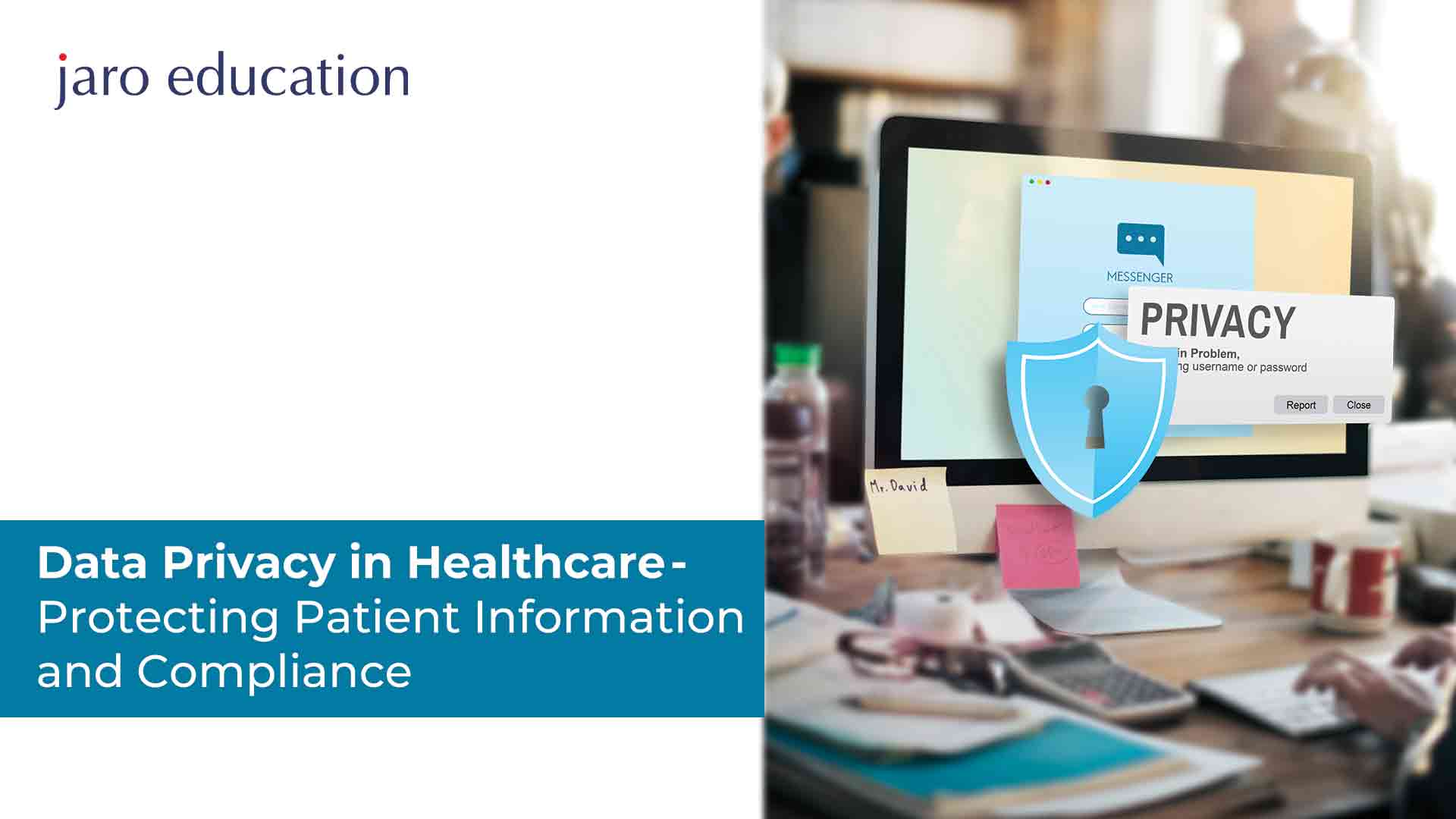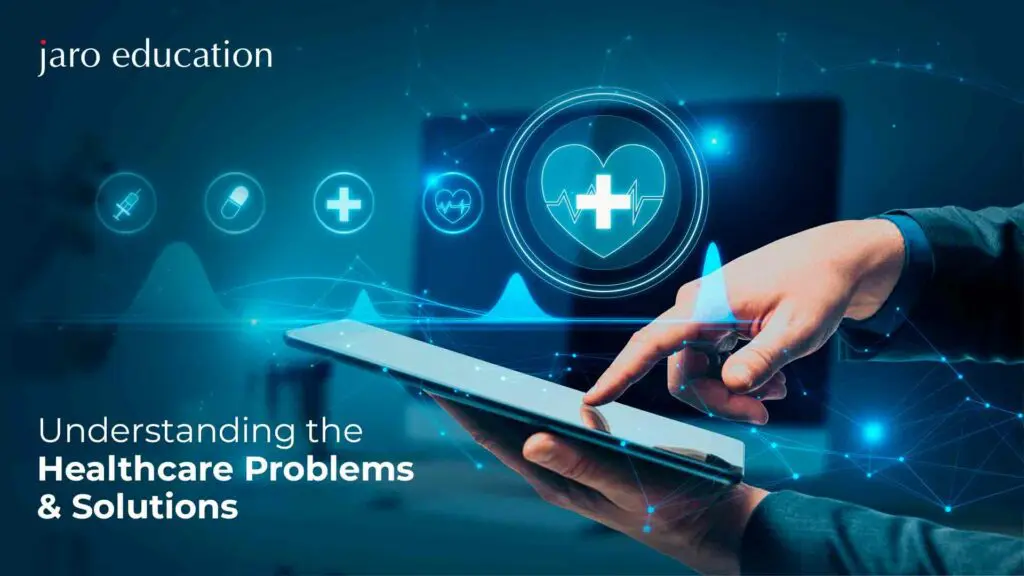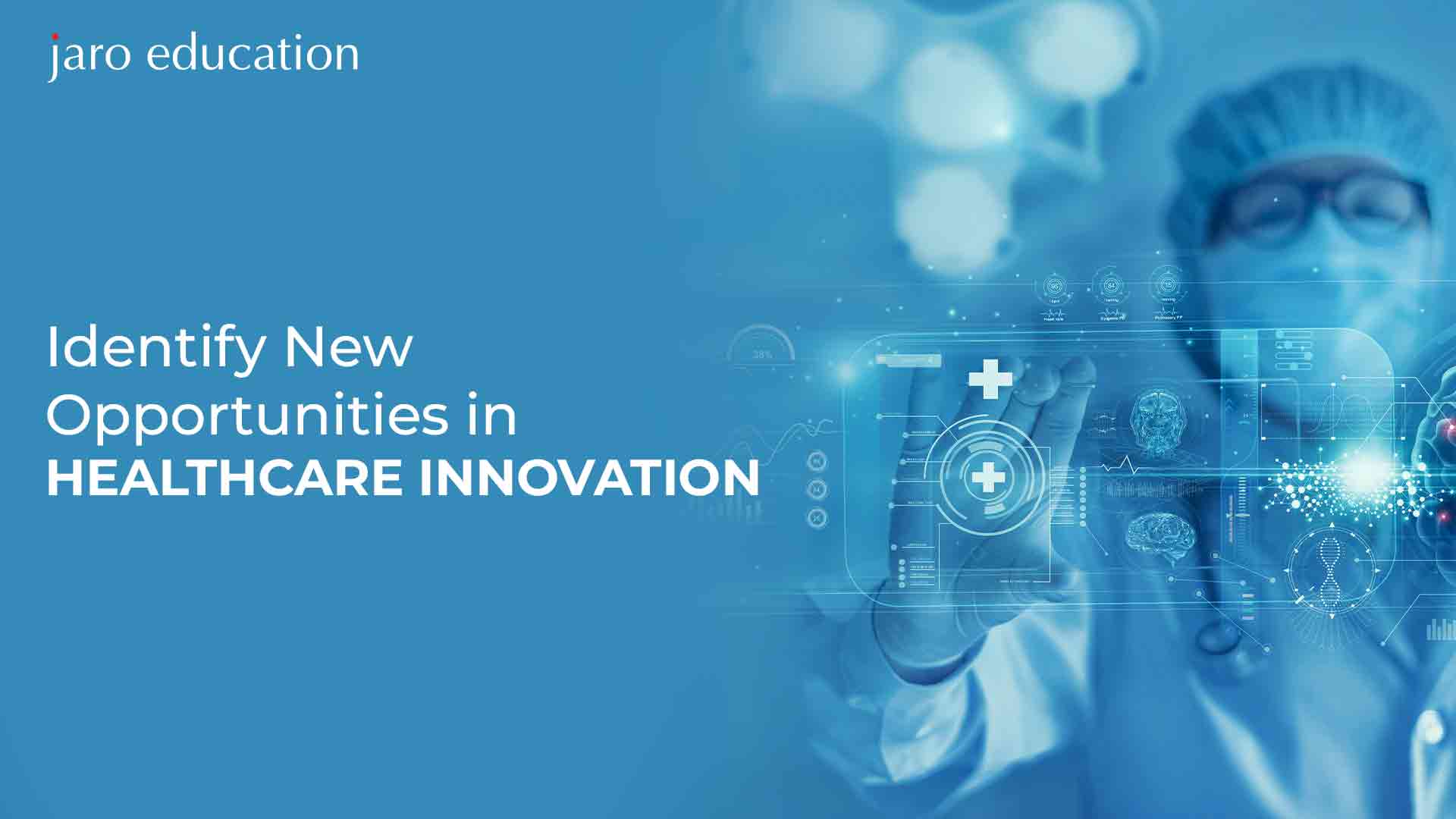Role of AI and Big Data in Healthcare
Table of Contents
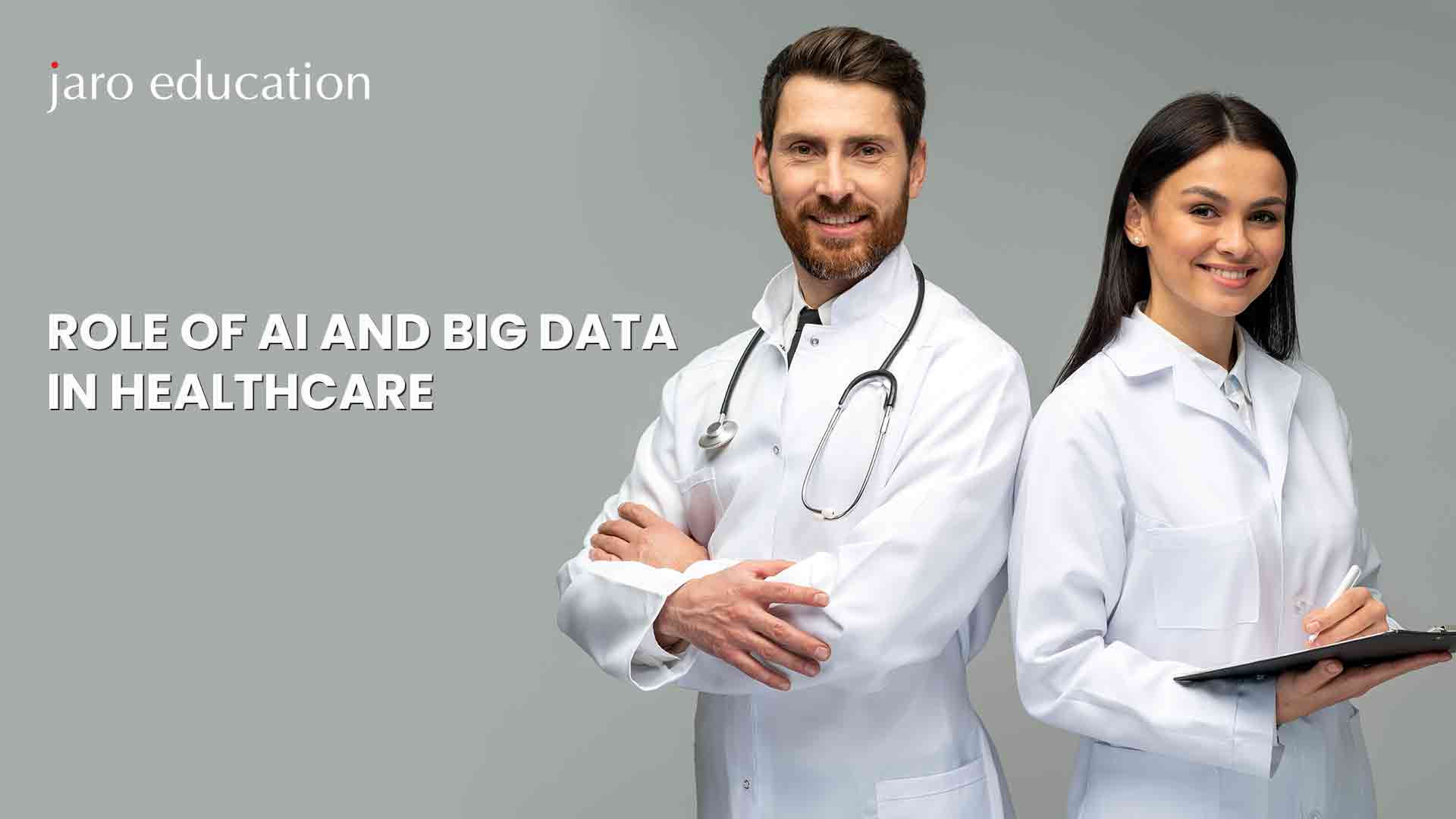
- jaro education
- 27, March 2024
- 10:00 am
In the ever-evolving landscape of healthcare, the integration of Artificial Intelligence (AI) and Big Data has emerged as a game-changer. This blog explores the profound effects of these technologies, delving into the “Healthcare 5.0” programme at IIT Delhi and its significance in shaping the future of the industry.
The Confluence of AI and Big Data in Healthcare
As we embark on an exploration into the future of healthcare, the nexus of Artificial Intelligence (AI) and Big Data emerges as a beacon, guiding the evolution of patient-centric care. In this extended discourse, we delve deeper into the transformative landscape carved by AI and Big Data within the corridors of the “Executive Programme in Healthcare for Industry 5.0” – a revolutionary course orchestrated by the venerable institution, IIT Delhi.
The intersection of AI and Big Data is reshaping the healthcare sector, bringing unprecedented advancements in diagnosis, treatment, and overall patient care. The “Healthcare 5.0” program at IIT Delhi stands at the forefront, emphasizing the pivotal role these technologies play in revolutionizing the industry.
The healthcare landscape is undergoing a transformative shift with the integration of AI and big data. The intersection of these technologies is projected to revolutionize healthcare outcomes, contributing to significant advancements by the year 2030, as per McKinsey and Company.
Unleashing the Potential of Remote Patient Monitoring
In the dynamic landscape of healthcare, the fusion of AI and big data is breaking the confines of traditional clinical settings. A transformative development is the integration of these technologies into remote patient monitoring. This innovative approach harnesses the power of wearable devices and IoT sensors, ushering in a new era of healthcare. By continuously collecting real-time health data, these devices empower patients and healthcare providers alike.
In this paradigm, AI algorithms take center stage, diligently analyzing the constant stream of health information. This analysis allows healthcare professionals to remotely monitor patients with unprecedented precision, opening avenues for proactive interventions. The ability to track evolving health patterns in real time enables healthcare providers to tailor treatments with a heightened level of accuracy. This not only enhances patient care but also contributes to the broader shift towards personalized and preventive healthcare strategies.
Accelerating Drug Discovery and Development
Within the realm of pharmaceuticals, the synergy of AI and big data acts as a powerful catalyst, propelling drug discovery and development to new heights. This transformative process leverages vast datasets comprising genetic information, clinical trial outcomes, and molecular structures. AI algorithms, with their unparalleled analytical capabilities, navigate through this wealth of information with speed and precision.
The result is an accelerated drug discovery process that identifies potential drug candidates more efficiently than ever before. This not only reduces the time traditionally required for drug development but also holds the promise of ushering in an era of more personalized and effective treatments. By unraveling intricate patterns within these extensive datasets, AI contributes to a paradigm shift in the pharmaceutical industry, offering hope for groundbreaking advancements that can address individual patient needs with unprecedented specificity.
Catalyzing Healthcare Innovations
At the forefront of cutting-edge advancements, IIT Delhi’s Healthcare 5.0 programme is pioneering transformative breakthroughs beyond traditional boundaries. In a collaborative effort across disciplines, researchers at IIT Delhi are pushing the boundaries of healthcare innovation by leveraging the dynamic duo of AI and big data.
This visionary programme goes beyond conventional practices, exploring novel avenues to revolutionize drug discovery. Through the strategic integration of computational power and state-of-the-art algorithms, IIT Delhi’s researchers are unraveling the complexities of vast datasets. This exploration is not just about identifying therapeutic targets; it’s a pivotal step toward shaping the future of precision medicine.
As the programme unfolds, it stands as a beacon of innovation, propelling healthcare into a new era where interdisciplinary collaboration and cutting-edge technologies converge to redefine the landscape of drug discovery and healthcare solutions.
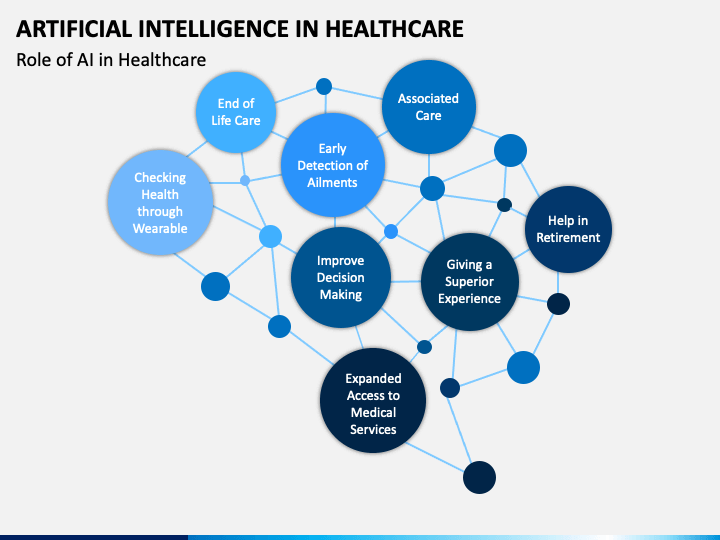
*sketchbubble.com
Understanding the Impact of AI in Healthcare
Boldly embracing the era of Healthcare 5.0, the impact of AI in healthcare is profound. AI algorithms analyze vast datasets with unparalleled speed and accuracy, enabling early disease detection, personalized treatment plans, and predictive healthcare analytics, which are as follows:
Early Disease Detection and Diagnosis
The use of AI in healthcare significantly improves early disease detection. Advanced algorithms analyze medical images, such as MRIs and CT scans, swiftly identifying anomalies that might escape the human eye. This not only expedites diagnosis but also enhances the chances of successful treatment.
Personalized Treatment Plans
AI-driven healthcare systems process vast amounts of patient data, considering individual medical histories, genetic factors, and lifestyle choices. This personalized approach allows for tailor-made treatment plans, optimizing outcomes and minimizing side effects.
Predictive Healthcare Analytics
Harnessing the power of predictive analytics, AI anticipates disease trends and patient outcomes. By analyzing historical patient data, AI models can forecast potential health issues, enabling proactive interventions and resource optimization in healthcare facilities.
Optimizing Resource Allocation
AI’s role extends beyond diagnostics to resource optimization. By analyzing patient data and operational patterns, AI enables healthcare providers to allocate resources efficiently. This aligns with the broader objective of the program “Healthcare 5.0,” emphasizing the strategic use of AI to enhance healthcare management.
Innovative Learning Modules
Healthcare 5.0 has innovative learning modules, where AI is not just a theoretical concept but a tangible force. Through real-world case studies and interactive learning, students are immersed in AI applications, preparing them for the dynamic healthcare landscape of tomorrow.
How AI Predicts Heart Attacks?
Plaque is made up of substances such as cholesterol and fat that circulate in the bloodstream. Over time, plaque builds up in the arteries, causing them to narrow and become stiff. Just as a sink drain can become clogged with food and debris, arteries can also become clogged with plaque, restricting blood flow and leading to a heart attack or stroke.
A medical test called Coronary computed Tomography Angiography (CTA) provides three-dimensional images of the heart and arteries. Plaque in the arteries is visible on CTA images, but it may take 25 to 30 minutes for a specialist to measure the amount of plaque. So researchers at Cedars Sinai developed an artificial intelligence algorithm that allows computers to perform the same task in seconds.
Researchers entered 900 images of coronary arteries that had already been analyzed by experts into a computer. In this way, the computer “learned” how to identify and quantify plaques in images. The measurement results of the artificial intelligence algorithm accurately predicted the heart attack incidence rate for 5 years for 1,611 people who participated in the related study.
Role of AI in Predictive Healthcare
The potential applications of AI in preventive healthcare are broad and profound. In addition to heart attacks, researchers are actively exploring ways to use AI to predict various diseases.
For example:
- AI could help currently healthy people determine who is likely to develop breast cancer in five years, based on information hidden in mammograms that today’s doctors cannot yet interpret.
- AI can predict which patients at a memory clinic are likely to develop dementia within two years.
- AI can help in the early detection of diabetes by identifying hidden correlation patterns in large patient data sets.
- AI can help predict acute kidney injury 48 hours before it occurs.
Additionally, AI is already being used in emergency rooms and intensive care units to help doctors treat the most vulnerable and at-risk patients. Vast amounts of data are stored in electronic medical records, laboratory results, vital signs, and medication records. Artificial intelligence algorithms can help doctors and nurses identify data patterns that alert them to changes in a patient’s condition or risk of serious complications. For example, AI can help:
- Early detection of sepsis, a life-threatening condition that occurs when the body’s immune system overreacts to infection.
- Identifying fetuses in distress using fetal heart monitoring data.
- Alerting the healthcare professionals that a patient connected.
- Notify when a patient on a ventilator requires adjustment.
The Role of Big Data in Transforming Healthcare
Big Data, a cornerstone of Healthcare 5.0, complements AI by providing the massive datasets necessary for training and refining algorithms. The synergy between big data and healthcare is instrumental in unlocking new frontiers of medical research, patient care, and operational efficiency. Here’s how big data play a vital role in ever-evolving healthcare industry:
Precision Medicine Advancements
In the era of healthcare transformation, the integration of big data in healthcare is propelling the evolution of precision medicine. This paradigm shift tailors medical treatments to individual patient characteristics, harnessing the vast potential of comprehensive datasets. From genomic information to treatment responses, healthcare professionals are empowered to make data-driven decisions that transcend one-size-fits-all approaches. The focus is on delivering more effective and personalized care by leveraging the wealth of information encoded in each patient’s unique medical profile.
Enhancing Patient Care and Experience
The advent of big data analytics in healthcare is redefining patient care by aggregating and dissecting information from diverse sources. Electronic Health Records (EHRs), wearables, and patient-reported data converge to provide a comprehensive and holistic view of an individual’s health. This wealth of information facilitates more informed and personalized care, enhancing the overall patient experience. By leveraging the power of data, healthcare providers are equipped to address individual needs with greater precision, fostering a patient-centric approach to healthcare delivery.
Optimizing Healthcare Operations
Big data’s influence extends beyond patient care, offering a strategic advantage in optimizing healthcare operations. Predictive analytics emerges as a key player, forecasting patient admission rates to ensure hospitals allocate resources efficiently. This proactive approach enhances the overall efficiency of healthcare delivery and resource utilization. By harnessing predictive analytics, healthcare institutions move towards a more streamlined and effective operational model, ultimately benefiting both providers and patients.
Predictive Analytics for Proactive Care
In the realm of healthcare, the predictive prowess of big data takes center stage, becoming a pivotal tool in identifying potential health risks. This capability is instrumental in fostering proactive healthcare strategies, enabling early intervention and preventive measures. By leveraging predictive analytics, healthcare professionals can anticipate and address potential health issues before they escalate, paving the way for a more proactive and personalized approach to patient care.
Community Health Forecasting
Within the broader context of societal well-being, students engaging in this programme become architects of community health. The analysis of health trends at a population level becomes a cornerstone of holistic healthcare strategies. By deciphering patterns and trends, students contribute to the overarching goal of improving community health, aligning with the programme’s commitment to comprehensive and far-reaching healthcare initiatives.
Unveiling the Pain Points in Healthcare
The Dilemma of Inefficient Systems
Healthcare has long grappled with inefficiencies—slow diagnosis, inadequate treatment plans, and a lack of personalized care. The impact of AI in healthcare is mitigating these challenges, streamlining processes, and enhancing overall efficiency.
Data Overload and Information Silos
Big data often leads to information overload, with valuable insights buried in silos. The marriage of big data and healthcare is breaking down these silos, unlocking the potential for data-driven decision-making, and ultimately improving patient outcomes.
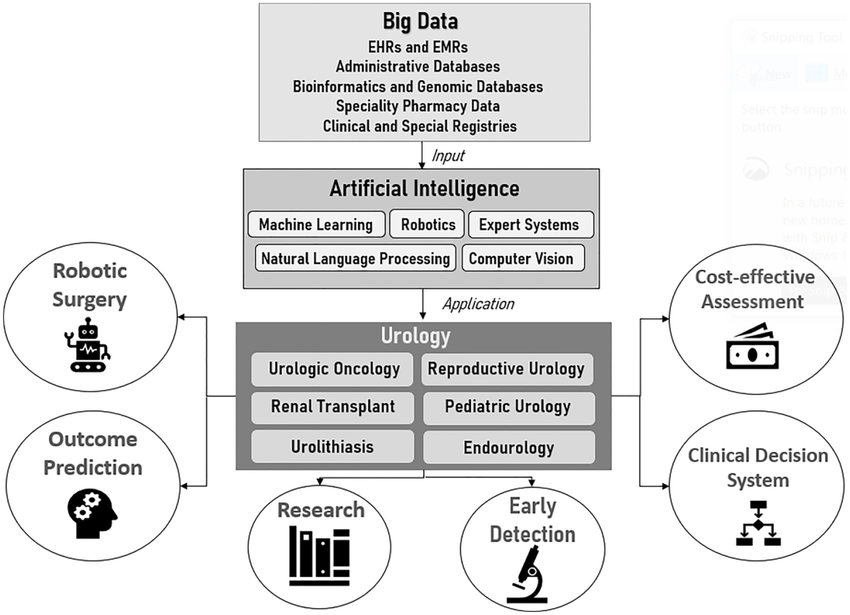
*researchgate.net
Real-world Applications: Showcasing Success Stories
AI-driven Surgical Innovations
Success stories exemplify the impact of AI in healthcare, with a spotlight on surgical innovations. AI-assisted surgeries have demonstrated higher precision and improved patient outcomes.
Big Data's Role in Population Health Management
Real-world applications of big data in population health management showcase its efficacy in identifying health trends and improving community well-being. It emphasises holistic healthcare strategies, aligning big data applications with societal health goals.
The Synergy of AI and Big Data
IIT Delhi’s “Healthcare 5.0” programme exemplifies the synergistic potential of AI and big data in transforming healthcare. Through cutting-edge research and interdisciplinary collaboration, the programme pioneers advancements that bridge the gap between data-driven insights and clinical applications.
Advancements in Medical Imaging
Researchers at IIT Delhi leverage AI algorithms on large medical imaging datasets. The application of deep learning techniques enhances the accuracy of diagnostics, showcasing the programme’s commitment to pushing the boundaries of healthcare innovation.
Navigating the Crucible: Understanding the Essence of Healthcare 5.0
Revolutionizing Healthcare Education
Beyond the conventional paradigms, Healthcare 5.0 at IIT Delhi stands as a testament to the evolution of healthcare education. It serves as an incubator for future leaders, arming them with a profound understanding of how AI and Big Data intersect with the intricate tapestry of healthcare delivery.
Holistic Integration of Technology and Medicine
Healthcare 5.0 exemplifies a paradigm where technology and medicine harmonize seamlessly. It transcends the traditional boundaries, infusing technological advancements into medical education, research, and practice.
Challenges and Future Outlook
While the impact of AI and big data in healthcare is monumental, challenges such as data privacy, ethical considerations, and algorithm bias must be addressed. The future outlook, however, is promising, with continuous advancements paving the way for a more interconnected, efficient, and patient-centric healthcare ecosystem.
Looking Ahead: The Evolution of Healthcare 6.0
As we reflect on the profound impact of AI and big data in healthcare, the industry is already on the brink of Healthcare 6.0. This evolution envisions a seamlessly interconnected healthcare ecosystem, where AI and big data continue to drive innovations in diagnostics, treatment, and healthcare delivery.
Continuous Learning and Adaptation
The dynamic nature of healthcare requires continuous learning and adaptation. AI algorithms, with the ability to learn from new data and adapt to evolving healthcare trends, play a pivotal role. IIT Delhi’s Healthcare 5.0 programme instils a culture of continuous learning, preparing professionals to navigate the ever-evolving landscape of AI and big data in healthcare.
Anticipating Technological Convergence
The discourse takes a visionary stance, foreseeing the convergence of AI, Big Data, and Healthcare 5.0. It explores the programme’s role in shaping thought leaders who will spearhead this convergence.
Addressing Challenges: Ethical Considerations and Algorithmic Bias
As the healthcare industry embraces the transformative potential of AI and big data, it must also confront ethical considerations. Safeguarding patient privacy, ensuring transparency in algorithmic decision-making, and mitigating biases in AI models are paramount.
Democratizing Access to Healthcare
AI and big data have the potential to democratize access to healthcare, transcending geographical barriers. Telemedicine platforms, supported by AI-driven diagnostics, extend medical expertise to remote areas. IIT Delhi’s programme recognizes the importance of inclusivity, striving to bridge healthcare disparities through technology-driven solutions.
Cybersecurity Concerns in Healthcare
The healthcare industry faces mounting cybersecurity challenges. The use of AI can bolster cybersecurity measures, protecting sensitive patient data. The synergy of big data and healthcare is explored in securing data integrity and privacy.
Final Thoughts
The convergence of AI and big data is reshaping the healthcare landscape, and programmes like “Healthcare 5.0” at IIT Delhi are leading the charge. As we navigate this transformative era, embracing the potential of AI and big data in healthcare is not just a technological leap but a commitment to a healthier, more efficient, and personalized future.
For those aspiring to excel in this dynamic field, the Executive Programme in Healthcare for Industry 5.0 by CEP, IIT Delhi, stands as a key enabler. To know more, contact Jaro Education.
Frequently Asked Questions
AI streamlines processes beyond diagnosis and treatment plans, optimizing administrative tasks, enhancing communication between healthcare providers, and minimizing delays in healthcare services to address broader inefficiencies.
Big data applications extend beyond population health management to address broader public health challenges, implement preventive measures, and enhance overall community well-being, supporting holistic healthcare strategies.
AI contributes to democratizing access by transcending geographical barriers. In addition to telemedicine platforms, AI facilitates remote diagnostics, personalized health recommendations, and health monitoring, ensuring medical expertise reaches remote areas without compromising quality.
AI addresses challenges beyond data integrity and privacy concerns, including proactive threat detection, rapid response to evolving cyber threats, and the development of robust cybersecurity protocols to safeguard against emerging risks in the dynamic healthcare IT landscape.
AI and big data facilitate continuous learning by providing AI-driven educational tools, virtual simulations, and real-time data updates. This ensures healthcare professionals stay informed about the latest medical advancements and adapt to the evolving healthcare landscape.




